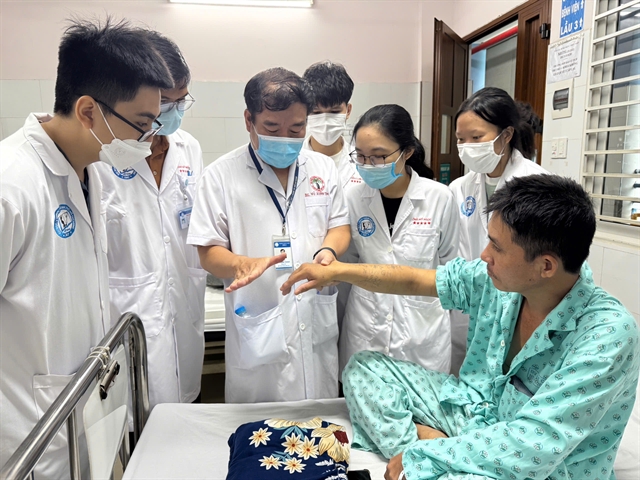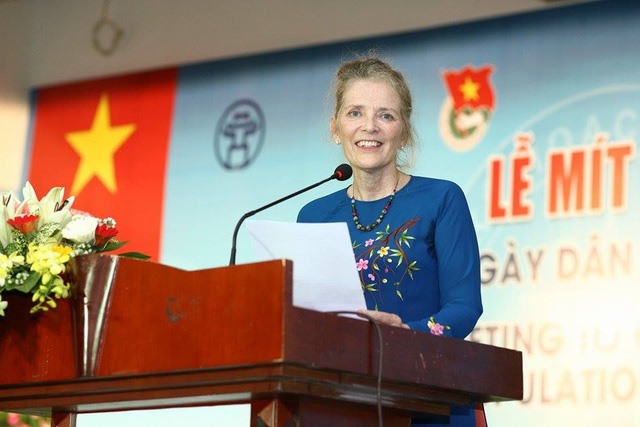 Opinion
Opinion

In daily life, we often talk about our work, life and things around us. I do the same, because I care about people and want to know about what matters to them to underscore our shared humanity. Life would not be as interesting nor society as advanced without human faces, stories and interactions.
 |
| Astrid Bant: UNFPA Vietnam Representative |
In daily life, we often talk about our work, life and things around us. I do the same, because I care about people and want to know about what matters to them to underscore our shared humanity. Life would not be as interesting nor society as advanced without human faces, stories and interactions.
While talking to my Vietnamese colleagues at the United Nations Population Fund (UNFPA), one thing that comes up constantly is how others outside our organisation view our work. Often, my colleagues’ friends equate the work of the UNFPA on population issues solely with family planning. But that is only half-true. The full truth is that the UNFPA’s work means that we place people at the centre, helping people realise their basic right to sexual and reproductive health so they can live healthy, quality lives.
When the UNFPA began its work in Việt Nam in 1977, the country was recovering from decades of devastating war. By the late 1970s, Việt Nam faced a faltering economy and widespread physical devastation. Families were poor and struggling to rebuild their lives.
The high fertility rate in the 1970s (more than five children per woman) and unmet need for contraception and family planning services added to the difficulties faced by women and their families.
Placing human beings and their needs to the forefront, that the UNFPA first provided support to Việt Nam to meet the need of the people on contraceptives and family planning. A trusted partner of the government, with a commitment to ensuring people’s rights to voluntary family planning and the need for robust maternal and newborn health care, the UNFPA brought information, experience, technology, capacity, medical equipment and contraceptive commodities to those most in need. Since then, the number and rate of women dying from complications of pregnancy or childbirth has decreased dramatically. Families are smaller, healthier and far more economically advanced, on average, than four decades ago. Millions of people have enhanced knowledge of sexual and reproductive health and better access to information and services they need.
The work of the UNFPA has been closely linked to the development of Việt Nam’s society and the needs of the Vietnamese people. After 1986’s doi moi (economic reforms), Việt Nam entered a new era. This shift opened up society, but also required more rigorous policy and social service changes to meet the needs of an increasing population.
The open economy brought opportunities and challenges for all of Việt Nam. To catch up with the world, Vietnamese citizens had to improve their education and health, access better services and create an equality of opportunity underscored by the urgent need to empower women and girls. Much policy work was needed to achieve this goal for every citizen.
After Việt Nam joined the International Conference on Population and Development in 1994, the UNFPA expanded its work in the country. The organisation worked to address Vietnamese sexual and reproductive health and gender equality. With the UNFPA’s support, the fertility rate continued to decline, and sexual and reproductive health needs were increasingly met. Women and girls were more empowered than ever to make choices based on sound information and increased access to services that enabled them to complete their education, enter the workforce, choose if and when to marry as well as if and when to have children, and how many.
Together with supporting service delivery, the UNFPA assisted Việt Nam in conducting all its population censuses (except for the first in 1979) and was the key player in ensuring the quality and reliability of population data and population trend projections.
Việt Nam’s population and health services and policies were improved and adjusted accordingly, aiming to ensure people’s rights, foster the country’s economic growth and, from 2000 to 2015, to meet the Millennium Development Goals (MDG). The UNFPA has been a leading partner contributing to Việt Nam’s impressive poverty reduction, ambitious MDG achievements and United Nations Population and Development Award.
Even with the country’s significant success in many areas of development, the work of the UNFPA has not stopped. There is still unfinished business on various fronts, especially given the 2030 Sustainable Development Agenda and its Sustainable Development Goals (SDGs) whose ultimate vision and pledge is to ensure that “no one is left behind." For Việt Nam, that means looking out for its population of more than 90 million people.
The dramatic population transition in the country from high to low fertility and increased life expectancy has presented Viet Nam new opportunities and challenges. Globalisation and technology have influenced people’s lives in many ways.
Yet, disparities have persisted and even widened in some population groups that remain vulnerable and whose needs must be met if Việt Nam is truly to achieve the SDGs. This includes ethnic minority populations, communities under the LGBTI umbrella, internal migrants, sex workers, people living with HIV and others, such as certain elderly populations, whose needs must be addressed with strategic policies that seek to transform marginalisation and discrimination into equality.
As such, the UNFPA has worked with government and civil society to help ensure these needs are highlighted, so that collaboration can meet these needs for everyone in every demographic and that sexual and reproductive rights and equality for all are ensured. Legal frameworks and policies on population issues have been improved to help Vietnamese people fulfill their potential.
With long-running and emerging population trends including the youth demographic dividend, the growing issue of rapid population ageing, immense flows of migration along with rapid urbanisation, and issues such as imbalanced sex ratio at birth, gender-based violence and increasing disparities, the work of the UNFPA in Việt Nam remains vital.
Even as we celebrate the successes of our collaboration with the Vietnamese government and people, more needs to be done to ensure a society where all can exercise their basic human rights, including the right to decide whether and when to have children, the number and spacing of children, and the information and the means to exercise these rights, and the right to have quality of life in every stages of one’s life cycle.
The UNFPA dedicates its work to each and every person in Việt Nam, each of whom deserves to have their rights fully recognised and to lead healthy, happy and productive lives.
*Astrid Bant: UNFPA Vietnam Representative